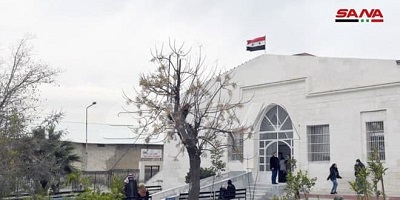Terrorism has targeted the city of Aleppo and all sectors that contribute to providing services to citizens, especially the health sector.
Four years ago, the Syrian Arab Army liberated the city of Aleppo from terrorist groups that had destroyed and sabotaged a large number of hospitals and health centers.
Director of Aleppo Health Dr. Ziyad Hajj Tahasaid that 52 health centers, hospitals, and medical points have returned to service and work after rebuilding them.
Dr. Ziyad Hajj Taha said that work is currently underway on the maintenance and rebuilding of ten health sites and equipping them with various supplies and medical devices .
He pointed out that a future plan has been drawn to rebuild more medical centers and points in the next year, support the ambulance system with new cars, and provide the Public Health Programs Department with general and specialized mobile clinics for tuberculosis, leishmaniasis and diabetes to serve remote areas.
He said that the national vaccination campaigns continue to vaccinate children in the governorate of Aleppo and enable medical teams to enter the town of Ain al-Arab after the absence of more than five years and vaccinate children in it.
He added that work has been done to remove the rubble from the National Hospital, which was destroyed and vandalized as a result of terrorism.
Regarding the work of the Directorate to deal with the Coronavirus, he stated that Zahi Azraq Hospital was designated to receive Corona patients in the section temporarily allocated to it in Al-Razi Hospital, and there is a special emergency section that was opened in Ibn Khaldun Hospital with a capacity of forty beds equipped with oxygen cylinders to accommodate the increasing numbers of infected people.
Dr. Abdel-Hadi Al-Hammoud, Chief Resident Doctors at the Zahi Azraq Hospital explained that the cardiac, digestive, internal, thoracic, joint, and multiple sclerosis clinics have been reactivated since the beginning of this year to receive patients throughout the week and conduct all emergency analyzes, electrocardiograms, chest radiographs, axial tomography, and echocardiography.
In the Jamal Abdel Nasser Medical Center in the liberated neighborhood of Al-Hulk, Dr. Fathi Sharabah, head of the center, said that the medical services provided to the neighborhoods of Al-Hulak, Bustan Al-Basha, Khan Al-Zaitoun, Sheikh Faris and Sheikh Khader, including vaccination, treatment of leishmaniasis, reproductive health and the children’s clinic, free of charge.
Dr. Michel Saadeh, head of the fourth health district in the Aleppo Health Directorate, said the Jamal Abdel Nasser Medical Center also receives suspected cases of the Coronavirus that are examined in a room designated for that and equipped with sterilizers, masks, gloves and a full dress for the examining doctor.
O. al-Mohammad

